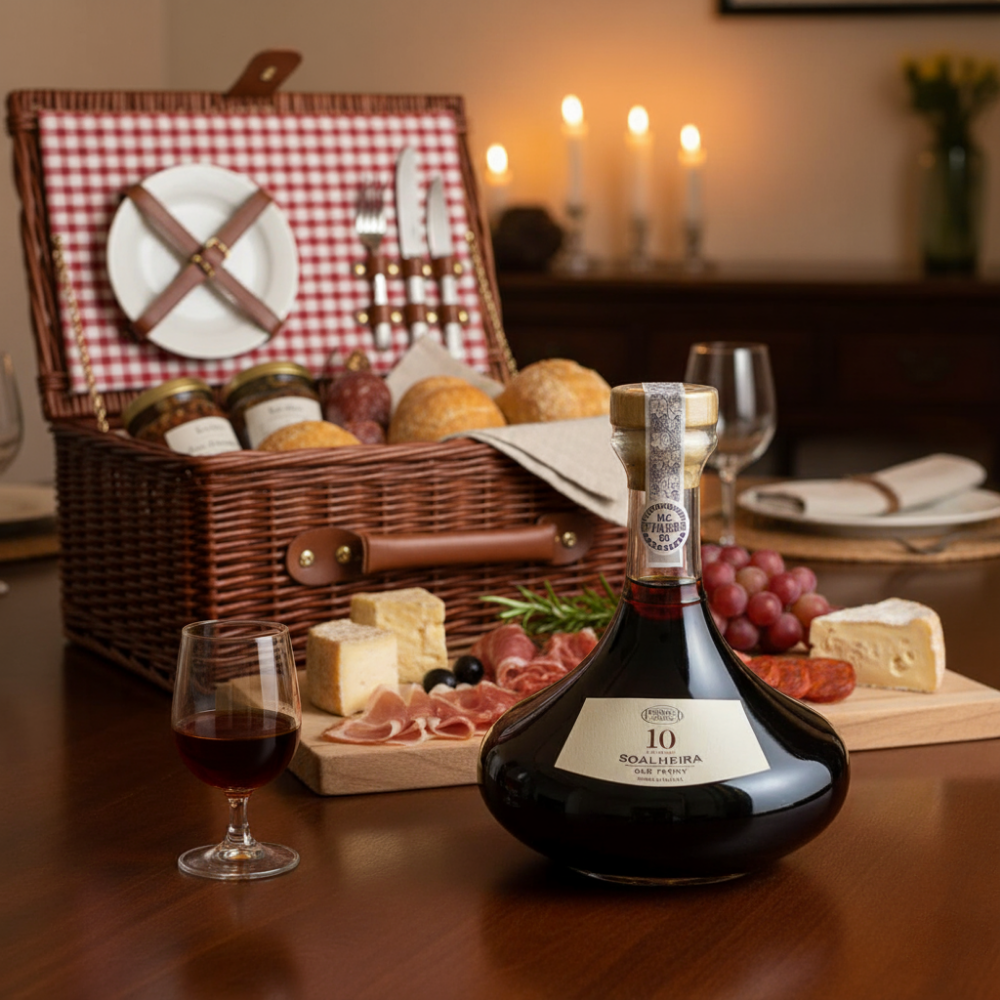Olá! Luís here again. When the weather cools and the evenings get darker, it’s the perfect time to enjoy a glass of something warm and special. In Portugal, that something is port. Rich, smooth and flavoursome, port wine is part of our tradition, often enjoyed at the end of a meal or shared during festive gatherings.
At Divino, we’re proud to bring you a selection of traditional Portuguese ports which are perfect for a cosy night in, a thoughtful gift or for rounding off your Christmas celebrations. Whether you’re new to port or looking to explore different styles, here’s a simple guide to help you discover the world of Portuguese port wine.
What is Port?
Port is a fortified wine made in the Douro Valley in northern Portugal. It’s made by stopping the fermentation of the grape juice early, adding a neutral grape spirit (aguardente) to preserve the natural sweetness. The result is a stronger wine (usually around 20% ABV) that is rich in flavour and built to last.
There are many types of port but they all share one thing. They’re made with care and tradition, often aged for years before reaching your glass.
A short history
Port has been made in Portugal for centuries. The English first developed a taste for it in the 17th century, and ever since, it has been one of Portugal’s most famous exports. The region where port is made, the Douro, was the world’s first officially demarcated wine region in 1756.
Today, the same traditional methods are used by families and producers. Each bottle tells a story of heritage, patience and Portuguese identity.
The Main Styles
If you’ve only tried one type of port before, you may be surprised to learn how varied it can be. Here are the most common styles you’ll find at Divino:
Tawny Port
This port is aged in wooden barrels, which gives it a lighter colour and smooth, nutty flavours. It often has notes of caramel, dried fruit and spice. It’s easy to drink and a good place to start.
Try: Borges Tawny Port ›
This beautifully packaged tawny has a soft, rounded taste with hints of vanilla and dried fruits. Ideal for after-dinner sipping or pairing with cheese.
Ruby Port
Ruby port is dark, fruity and full-bodied. It’s usually younger and aged for a shorter time in large tanks to keep its fresh flavour. If you like berry notes and a richer mouthfeel, this one is for you.
Try: Borges Ruby Port ›
Bright and expressive, with flavours of blackberry, plum and dark chocolate. A great match for chocolate desserts or simply sipped on a cold evening.
White Port
Made from white grapes, this style is lighter and often served chilled. Some versions are dry and others are sweet. In Portugal, we enjoy white port with tonic water, ice and a slice of orange as an aperitif.
Try: Pacheca White Port ›
Fresh and lightly sweet, with notes of citrus, almonds and a touch of vanilla. Serve cold or mix into a white port & tonic.
How to Serve
- Tawny and Ruby Ports are best served at room temperature
- White Port should be chilled, especially if mixing into cocktails
- Use small glasses (port or sherry glasses are ideal) to enjoy the aroma
- Once opened, most ports can last up to 3–4 weeks when stored in a cool place

For Gifting and Gatherings
Port makes a beautiful gift. It’s thoughtful, elegant and can be enjoyed slowly through the season. Whether you’re bringing a bottle to dinner, sending a festive thank-you or building a custom hamper, port always feels like a treat.
Our Borges Tawny Port in Decanter comes ready to give in a lovely bottle that looks as good on the table as it tastes in the glass.
You can also create your own gift with:
- A bottle of port
- A wedge of cheese or a small cured meat
- A jar of Portuguese olives or fig jam
- A handwritten tag with serving ideas
Perfect for friends, work colleagues or family who enjoy something a little different.
Pairing Tips
- With cheese: Tawny port works well with aged cheeses like Manchego or Portuguese Queijo da Serra
- With chocolate: Ruby port is your best match. The sweetness complements dark cocoa
- As an aperitif: White port with tonic is light, refreshing and easy to make
- With dessert: Pair tawny with crème brûlée, or ruby with poached pears or chocolate mousse
A Portuguese Tradition for Every Table
Port is not just for wine experts. In Portugal, it’s for everyone. A drink to enjoy at your own pace, with or without food, around the table or by the fire.
Explore our full range of Portuguese ports at Divino.je
Saúde and Feliz Natal!


